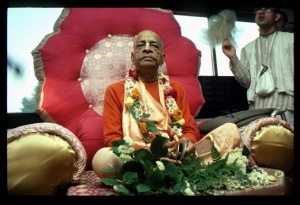BG 1.43: Difference between revisions
m (1 revision(s)) |
(Vanibot #0020 edit - link to the Version Compare feature) |
||
| Line 1: | Line 1: | ||
{{ | [[Category:Bhagavad-gita As It Is (1983+) - Chapter 01]] | ||
<div style="float:left">'''[[Bhagavad-gita As It Is (1983+)]] - [[BG 1 (1983+)|Chapter 1: Observing the Armies on the Battlefield of Kuruksetra]]'''</div> | |||
<div style="float:right">[[File:Go-previous.png|link=BG 1.42]] '''[[BG 1.42]] - [[BG 1.44]]''' [[File:Go-next.png|link=BG 1.44]]</div> | |||
{{CompareVersions|BG|1.43|BG 1972|BG 1983+}} | |||
{{RandomImage}} | |||
==== TEXT 43 ==== | ==== TEXT 43 ==== | ||
<div class="devanagari"> | |||
:उत्सन्नकुलधर्माणां मनुष्याणां जनार्दन । | |||
:नरके नियतं वासो भवतीत्यनुशुश्रुम ॥४३॥ | |||
</div> | |||
<div | <div class="verse"> | ||
:utsanna-kula-dharmāṇāṁ | |||
:manuṣyāṇāṁ janārdana | |||
:narake niyataṁ vāso | |||
:bhavatīty anuśuśruma | |||
</div> | </div> | ||
==== SYNONYMS ==== | ==== SYNONYMS ==== | ||
<div class="synonyms"> | |||
<div | ''utsanna''—spoiled; ''kula-dharmāṇām''—of those who have the family traditions; ''manuṣyāṇām''—of such men; ''janārdana''—O Kṛṣṇa; ''narake''—in hell; ''niyatam''—always; ''vāsaḥ''—residence; ''bhavati''—it so becomes; ''iti''—thus; ''anuśuśruma''—I have heard by disciplic succession. | ||
</div> | </div> | ||
==== TRANSLATION ==== | ==== TRANSLATION ==== | ||
<div class="translation"> | |||
<div | |||
O Kṛṣṇa, maintainer of the people, I have heard by disciplic succession that those whose family traditions are destroyed dwell always in hell. | O Kṛṣṇa, maintainer of the people, I have heard by disciplic succession that those whose family traditions are destroyed dwell always in hell. | ||
</div> | </div> | ||
==== PURPORT ==== | |||
= | <div class="purport"> | ||
Arjuna bases his argument not on his own personal experience, but on what he has heard from the authorities. That is the way of receiving real knowledge. One cannot reach the real point of factual knowledge without being helped by the right person who is already established in that knowledge. There is a system in the ''varṇāśrama'' institution by which before death one has to undergo the process of atonement for his sinful activities. One who is always engaged in sinful activities must utilize the process of atonement called the ''prāyaścitta''. Without doing so, one surely will be transferred to hellish planets to undergo miserable lives as the result of sinful activities. | |||
</div> | |||
<div | <div style="float:right; clear:both;">[[File:Go-previous.png|link=BG 1.42]] '''[[BG 1.42]] - [[BG 1.44]]''' [[File:Go-next.png|link=BG 1.44]]</div> | ||
__NOTOC__ | |||
</div> | __NOEDITSECTION__ | ||
__NOTOC__ | |||
Revision as of 18:54, 7 December 2017

A.C. Bhaktivedanta Swami Prabhupada
TEXT 43
- उत्सन्नकुलधर्माणां मनुष्याणां जनार्दन ।
- नरके नियतं वासो भवतीत्यनुशुश्रुम ॥४३॥
- utsanna-kula-dharmāṇāṁ
- manuṣyāṇāṁ janārdana
- narake niyataṁ vāso
- bhavatīty anuśuśruma
SYNONYMS
utsanna—spoiled; kula-dharmāṇām—of those who have the family traditions; manuṣyāṇām—of such men; janārdana—O Kṛṣṇa; narake—in hell; niyatam—always; vāsaḥ—residence; bhavati—it so becomes; iti—thus; anuśuśruma—I have heard by disciplic succession.
TRANSLATION
O Kṛṣṇa, maintainer of the people, I have heard by disciplic succession that those whose family traditions are destroyed dwell always in hell.
PURPORT
Arjuna bases his argument not on his own personal experience, but on what he has heard from the authorities. That is the way of receiving real knowledge. One cannot reach the real point of factual knowledge without being helped by the right person who is already established in that knowledge. There is a system in the varṇāśrama institution by which before death one has to undergo the process of atonement for his sinful activities. One who is always engaged in sinful activities must utilize the process of atonement called the prāyaścitta. Without doing so, one surely will be transferred to hellish planets to undergo miserable lives as the result of sinful activities.